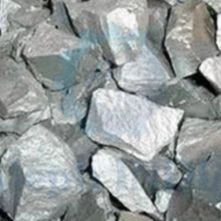Get A Quote
BIS Certification for Silicomanganese IS 1470: 2013

The product
satisfies the quality and safety requirements established by the Bureau of
Indian Standards, thanks to its BIS Certification for Silicomanganese, Specification
IS 1470: 2013. Steelmaking makes extensive use of silica and manganese, and
adherence to IS 1470:2013 ensures constant performance and chemical
composition. Manufacturers that want to sell in India must have this
accreditation, which increases market trust.
Businesses show their dedication to quality, regulatory compliance, and industry excellence by gaining BIS Certification for Silicomanganese IS 1470: 2013, which guarantees easy market access and enhanced product credibility.
According to the
Ministry of Steel's Steel and Steel Products (Quality Control) Order, 2024, BIS
Certification for Silicomanganese, Specification IS 1470: 2013, is now
required. The criteria for silicomanganese, an essential ferroalloy used to
improve strength and deoxidation in steel manufacture, are outlined in this
standard. Before selling or distributing the product in the Indian market,
manufacturers must get BIS certification to guarantee adherence to quality and
safety requirements. Under Specification IS 1470: 2013, BIS Certification for
Silicomanganese guarantees product dependability, customer safety, and
regulatory acceptability.
Why is BIS certification necessary for Silicomanganese IS 1470: 2013?
To guarantee product quality, safety, and adherence to Indian standards, silicomanganese must be BIS certified under Specification IS 1470: 2013. With this certification, the alloy's suitability for use in the manufacturing of steel and other industrial applications is confirmed, since it satisfies certain chemical and physical requirements. Additionally, it increases buyer trust and market credibility. To ensure standardised performance and regulatory compliance, producers and importers who wish to sell their goods in the Indian market must get BIS Certification for Silicomanganese, Specification IS 1470: 2013.
Overview of Indian Standard IS 1470: 2013
The criteria for
Silicomanganese, an essential alloy used in steelmaking, are laid forth in
Indian Standard IS 1470:2013. To guarantee constant quality and performance,
this standard addresses the chemical composition, sampling techniques, and
testing protocols. Adherence to IS 1470:2013 guarantees that the product
satisfies industry-grade standards for elements such as carbon, silicon, and
manganese. To guarantee quality and marketability, producers must get BIS
Certification for Silicomanganese, Specification IS 1470: 2013. This
accreditation promotes consumer trust, aids in regulatory compliance, and eases
commerce in both home and foreign markets.
Process for BIS Certification
The BIS certification process for Silicomanganese IS 1470: 2013 and involves multiple steps designed to thoroughly
evaluate a product's compliance with the required standards. Here is a general
overview of the certification process:
1. Application Submission:
Manufacturers must submit an application form along with the required
documentation to BIS.
2. Documentation Review: BIS
reviews the submitted documents to ensure completeness and correctness.
3. Factory Inspection: BIS
officials conduct an on-site inspection of the manufacturing facility to assess
the production process and quality control measures.
4. Sample Testing: Product samples
are taken and tested in BIS-approved laboratories to verify compliance with
Indian standards.
5. Certification Grant: Upon successful completion of the inspection and testing, BIS grants certification, allowing the manufacturer to use the BIS mark on their products.
Documents Required for BIS Certification
To apply for BIS certification, manufacturers need to submit the following documents:
● Application form
● Manufacturing process details
● Quality control plan
● Test reports from BIS-approved laboratories
● Factory layout and equipment details
● Proof of business registration
● Product specifications and technical details
● Declaration of conformity to Indian standards
Additionally, manufacturers may be required to provide proof of compliance with environmental and safety regulations, depending on the specific type of product being certified.
BIS ISI Mark Certification Costing And Timeline
To Know The Process in Detail, Please Visit:
Under BIS Registration Products ISI and CRS
Conclusion
In conclusion, firms that want to guarantee adherence to Indian quality and safety requirements must get the BIS Certification for Silicomanganese IS 1470: 2013. This certification improves the product's market credibility both locally and abroad, in addition to confirming that it complies with the necessary chemical and physical requirements. Our specialty at EVTL India is accurately and effectively assisting manufacturers with the BIS certification procedure. To assist companies in navigating regulatory hurdles and obtaining smooth product clearance, our team offers professional consulting. Businesses may increase consumer trust, lower the chance of product rejection, and obtain a competitive edge in the market by obtaining the BIS Certification for Silicomanganese IS 1470: 2013. You may rely on EVTL India to be your trustworthy partner in fulfilling compliance requirements and attaining sustained company expansion via certified performance and quality.
Free Call Back
Latest News & Update
📅 BIS Critical Component List (CCL) Updates for Solar PV Modules
🕒 BIS Fee Concessions for MSMEs and Startups | EVTL India
📅 Guidelines for Implementation of Essential Requirements for Security of CCTV
🕒 Omnibus Technical Regulation (OTR) Amendment Order, 2025
🕒 Extension of Timeline for Filing Annual Returns by Battery Producers
📅 Extension of Timeline for Filing Quarterly and Annual Returns for E-Waste
🕒 Extension of Concurrent Running Period for IS 302-1: 2008 and IS 302 (Part 1): 2024
🕒 BIS Guidelines for Grant of Licence (GoL) | EVTL India
📅 CPCB Guidance on filing of Application, Fees and more
🕒 CPCB Notification on Labelling of Plastic Packaging
📅 Mandatory Compliance for Input Materials of Steel and Steel Products for Imports
🕒 BIS Guidelines for Scheme-X Certification for OTR-Regulated Products
📅 BIS Upgrades Product Certification License Numbers to 10-Digit Series
🕒 BIS Certification No Longer Mandatory for 14 Chemical & Polymer Categories
Why Choose EVTL INDIA
Expertise in Indian Regulatory Standards
End-to-End Support
Trusted by Top Indian & Global Brands
Fast Processing & Transparent Pricing
Strong Liaison with Indian Authorities
Company Profile















